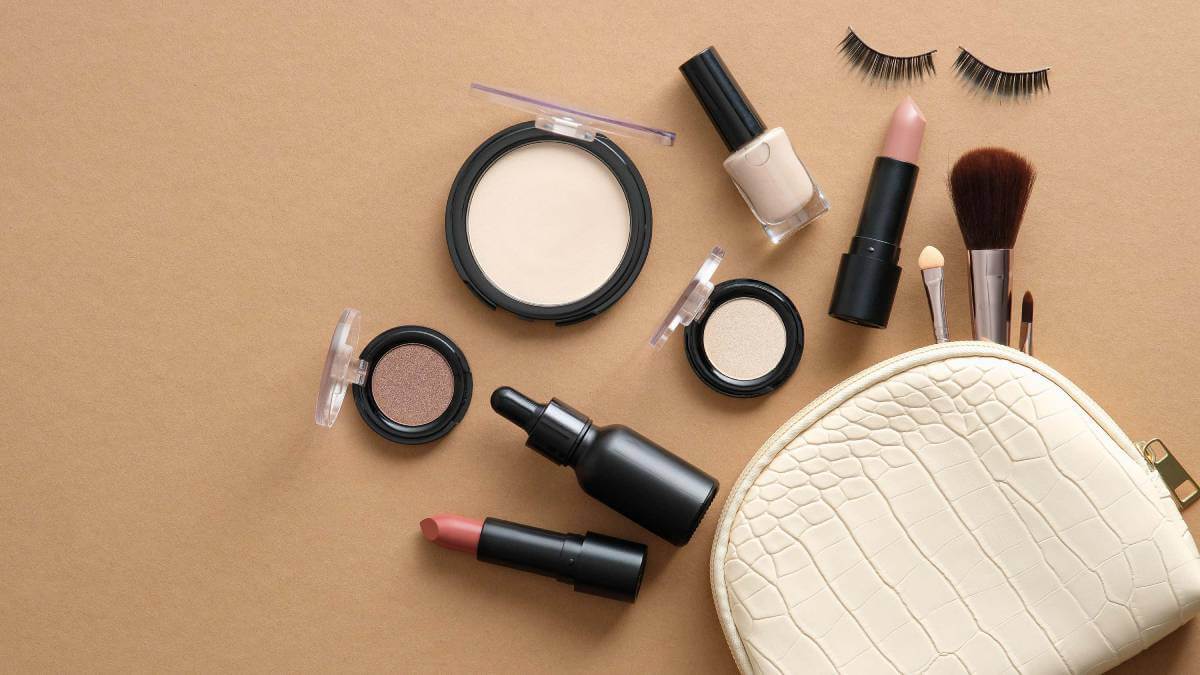A TikTok video showing a beauty influencer cutting open a brand new make-up sponge to reveal spots of mould has gone viral, racking up more than 18 million views.
Beauty influencer Kaitlyn Son, aka mycorneroftheuniverse, sliced the bright-pink teardrop-shaped blender into three pieces and found there was black mould speckled throughout.
View this post on Instagram
Viewers were horrified that even an unused sponge could be so dirty, with many commenting under the video saying they’ve had their blenders for years and wondering if it’s time to get a new one.
Unfortunately, a mouldy beauty sponge isn’t the only health risk that could be hiding in your make-up bag.
We asked medical experts to explain everything you need to know about keeping your cosmetics – and your face – clean.
Eye make-up

“Eye make-up is probably the most important part of your make-up bag to maintain good hygiene, due to the delicate tissues around the eyes making it easier for pathogens to cause infections and acting as a direct entry point,” says Dr Hana Patel, GP and women’s health specialist at Superdrug Online Doctor.
Liquid products such as mascara and eyeliner tend to be more of a problem than things like eyeshadow.
“Mascara and eyeliner tubes create a dark and moist environment, which is conducive to the growth of bacteria and harmful microorganisms,” Dr Patel says.
“To minimise these risks, it is recommended to replace these products every three to six months, and avoid pumping the wand, as this introduces air and can lead to contamination.”
And never share eye make-up products: “There is a much higher chance of transmitting infections from one person to another. If you notice any signs of irritation, redness, or itching, discontinue use immediately.”
Base products
View this post on Instagram
“Not practising good hygiene with foundation, powders, bronzers and blushes can result in skin irritation and acne through transferred bacteria entering and clogging your pores,” says Dr Patel.
In addition, make-up brushes or blenders used to apply base products can be a magnet for bacteria.
“Brushes collect all sorts of undesirable debris, including your make-up product, dirt and oil,” says Dr Miriam Adebibe, aesthetic doctor and founder of Dr Miriam A Skin Clinic.
“This is a great breeding ground for bacteria and viruses, which can cause acne breakouts, skin irritation, and introduce infection where the skin barrier has broken down for any reason.”
Dr Simon Theobalds, GP at Pall Mall Medical, recommends washing your make-up brushes at least once a week: “You can use a gentle, antibacterial soap or a specialised brush cleanser for this purpose. It’s vital to ensure that your brushes and beauty blenders dry completely between uses, as damp tools create a breeding ground for bacteria.”
After allowing your tools to air dry thoroughly, store them in a clean and dry environment, he continues: “Avoid leaving them in humid areas, as moisture encourages bacterial growth. Consider using breathable containers or brush holders.”
Whether you use a blender, a brush or your fingers to apply products, Dr Theobalds says: “Always wash your hands before applying make-up to prevent transferring dirt and bacteria onto your face and make-up tools.”
Lipstick and gloss

Swiping lipstick or balm directly from the bullet onto your lips may be the most convenient application method, but it’s not the most hygienic.
“It’s best to use clean lip brushes or disposable applicators instead of applying directly from the product packaging – this prevents the transfer of bacteria from your lips back into the product,” Dr Theobalds says.
Adebibe agrees: “Applying lip balm with your finger can transfer dirt and bacteria into your balm and onto your lips. Make sure to wash your hands before applying to avoid this.”
Never share lip products, Dr Theobalds warns: “Especially with individuals with compromised immune systems, as this increases the risk of spreading infections,” such as herpes simplex, which can cause cold sores.
“It’s also important to discard any lip products that have changed in texture, smell, or colour.”
Don’t forget to include lip brushes when doing your weekly wash, he adds: “Use a mild, antibacterial soap or brush cleanser. Make sure your brushes are thoroughly dry before using them to prevent the growth of bacteria.”
Make-up bag
View this post on Instagram
“Make-up bags will naturally accumulate bacteria over time, especially if make-up products spill or if brushes and applicators are not cleaned regularly,” Dr Patel says.
“Bacterial growth in the bag increases the risk of skin infections and irritations when using the stored products.”
Nasties can transfer from one product to another, and if you store your make-up bag in the humid environment of a bathroom it can promote bacterial growth.
“To address this concern, it is advisable to frequently clean both the inside and outside of your make-up bag using a mild disinfectant or wipes,” Dr Patel says.
“Use separate compartments within the bag for different types of products to prevent cross-contamination. Opt for make-up bags made of washable materials that can be easily cleaned or wiped down.”
How often do you clean your make-up bag and brushes? Why not share your experience in the comments section below?
Also read: Apply your make-up to look younger
– With Katie Wright

